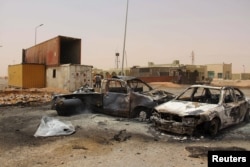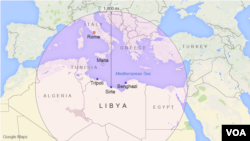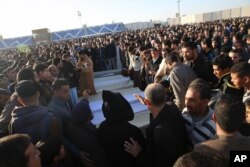The Islamic State has a new front: an established foothold in Libya.
And Libya gives IS a new opportunity: a place from which to expand into Africa and Europe.
"Libya is one of the top two or three provinces claimed by IS, and the most dangerous," said Tom Joscelyn, a senior fellow at the Foundation for Defense of Democracies.
While IS has had a presence in the chaos of post-Gadhafi Libya since late 2014, it has recently solidified its control of the coastal city of Sirte.
Analysts estimate the extremist group has several thousand fighters in place in Libya, a large number of them veterans of the war in Syria and Iraq.
The core is believed to be made up of Libyans, Tunisians and, some suspect, Europeans.
"They are able to control real territory, and control much of Sirte and surrounding towns. They have something they can latch onto even if they are overblowing how much a ‘province’ it is," Joscelyn told VOA.
IS-claimed "provinces" include pockets in Afghanistan, Egypt and Yemen.
Rowboat ride to Italy
Libya's Sirte is between the main cities of Tripoli and Benghazi, and across the Mediterranean from Italy.
"Libya to Italy, you can do by a rowboat," noted Cyril Widdershoven, a Netherlands-based security analyst.
Having a foothold in Libya could prove a significant boost to IS, both as a propaganda tool and in operational terms.
"It says, we can have a presence wherever we choose,” Widdershoven told VOA. “It is not up to NATO, Washington, or London or Brussels. If you want us out of Iraq, we will go to Libya, and if you come to Libya, we can move to Egypt or back to Iraq."
The closeness to Europe adds to the group's claims of an expanding caliphate.
"Libya provides them a launching-off point to Rome, the symbol of Christendom. This becomes a very powerful talking point for them," Joscelyn said.
Operationally, Libya also provides a number of advantages.
“IS in Syria and Iraq are already suggesting that European fighters can go there by boat,” said Jacob Zenn, an African affairs fellow at the Jamestown Foundation. “Or, you can go to Europe by boat.”
“They’re already beginning to explore those opportunities,” Zenn told VOA on the phone from Nigeria.
African base
The Islamic State is also looking to expand inside Africa.
Libya could open up "a new market of consumers — young Africans who may be interested in the idea of the caliphate and the very action-oriented methodology of ISIS and its social media outreach," Zenn said.
A permanent base in Libya would make the extremist group more flexible and versatile. From Libya, "they can work harder to expand in Mali" and recruit more in countries such as Chad and Nigeria, Zenn said.
It would allow IS to expand its Middle Eastern character and add an African profile, he said.
In 2014, the Nigeria-based extremist group Boko Haram — one of the most prolific jihadist organizations in the world in terms of attacks and casualties — pledged allegiance to IS.
Joscelyn said IS has been supplying Boko Haram through its base in Libya, showing Boko Haram they could form a united network all the way through Nigeria.
"These networks are much more cohesive than people realize," Joscelyn noted.
From a propaganda standpoint, being able to say that IS exists in West Africa through Boko Haram has also been a significant coup for the terrorist group, which is in stiff competition for jihadi supremacy in the region.
Al-Qaida and other jihadist groups, tribal gangs and criminal networks are rife in Libya, a country run by rival governments that have little control beyond their own power bases.
Although Joscelyn cautioned that IS has exaggerated its actions in Libya, he said in some areas of Libya it has become the strongest jihadist group present.
IS recently claimed a number of suicide bomb attacks in Libya, including at a police training center Thursday in Zliten that killed more than 50 people.
Libyan oil
Similar to its expansion in Iraq and Syria where IS captured cities and then expanded to seize territory and economic resources such as oil, grain and water, the group is aiming at oil targets in Libya.
This week, Islamic State militants were fighting Libyan forces for control of crucial eastern oil terminals.
"The bigger issue for IS now is consolidating, to settle in Libya, to establish governance in Libya and really make their presence in Libya permanent," Zenn said.
Analysts do not see an easy fix to Libya.
"Libya is part of a bigger problem, and no one knows how to turn it back and stop it," Joscelyn said.

















